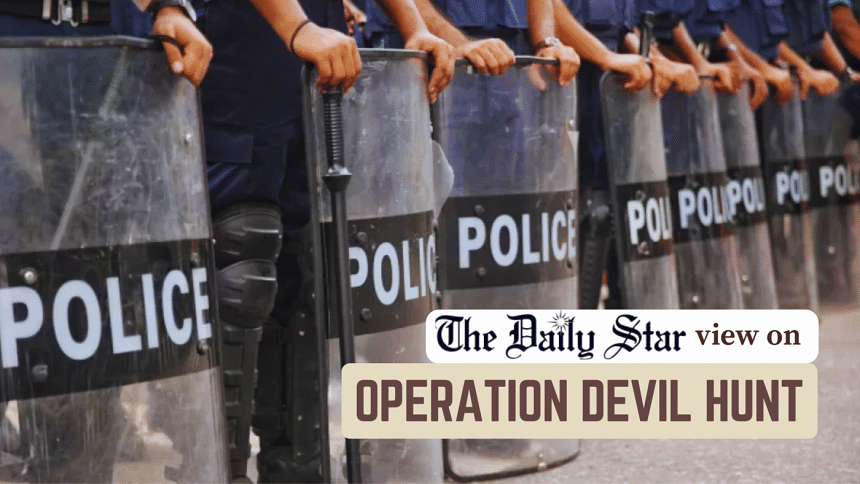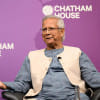A show of force is not enough to curb crime and tensions

Given the turbulent events of the past week—marked by renewed anti-fascist protests, disruptions, and unanticipated pushback at times—the Operation Devil Hunt, launched nationwide on Saturday night, can be seen as mostly a step in the right direction. We say "mostly" because of its limited operational scope and overreliance on a law enforcement approach to an issue that extends far beyond policing. While announcing the drive, the home ministry stated that law enforcement forces would target "saboteurs who attacked students, individuals with warrants, and troublemakers" to curb mob violence and restore law and order. The decision follows an attack at the residence of former Awami League minister AKM Mozammel Haque in Gazipur, where a false alarm of robbery led to 15 people, including student leaders of the July uprising, being assaulted.
Since launching the drive, joint forces have detained 1,308 people across the country. It can be recalled that the joint forces, including the army, police, RAB, and BGB, have been active nationwide since September 4 to recover looted firearms and maintain law and order. Later, the government granted magistracy power to commissioned army officers so that they can intervene more decisively. That security issues have still persisted—as evidenced by the events on Wednesday and Thursday that led to the demolition of Mujib's Dhanmondi 32 residence, along with attacks, vandalism, and arson targeting Awami League-linked houses and establishments in 35 districts, and eventually to attacks on students—raises questions about how effective the latest operation will be, even within its stated goal of combating the remnants of Awami fascism.
The fact is, the security situation is too fluid at the moment to pin responsibility on any single entity. While some of the events of the past week can be traced to Awami League or Sheikh Hasina, some factions within the anti-fascist movement also bear responsibility for escalating tensions. The festering polarisation and rising extremism threaten to undermine the very ideals that fuelled the July uprising. The resulting chaos—readily exploited by criminal elements—cannot be neutralised by force alone.
The fact is, the security situation is too fluid at the moment to pin responsibility on any single entity. While some of the events of the past week can be traced to Awami League or Sheikh Hasina, some factions within the anti-fascist movement also bear responsibility for escalating tensions. The polarisation festering within different factions as well as rising extremism threaten to undermine the very ideals that fuelled the July uprising. The resulting chaos—readily exploited by criminal elements—cannot be neutralised by force alone. As an assessment of law and order under the interim government shows, criminals perceive the current environment as favourable for carrying out illicit activities, with a still weak and demoralised police force struggling to contain them.
Therefore, for Operation Devil Hunt to be effective, it cannot be just another show of force—it must be part of a broader strategy involving political parties and other stakeholders of post-uprising Bangladesh to restore order and stability. That means targeting not only remnants of Awami League's fascist apparatus but also those who are exploiting the current instability for personal or political gains. The authorities must also use the operation to tackle rising crime including mugging, extortion, and other public safety threats. They must send a strong message that no one involved in jeopardising public safety and law and order will be spared.


 For all latest news, follow The Daily Star's Google News channel.
For all latest news, follow The Daily Star's Google News channel. 









Comments